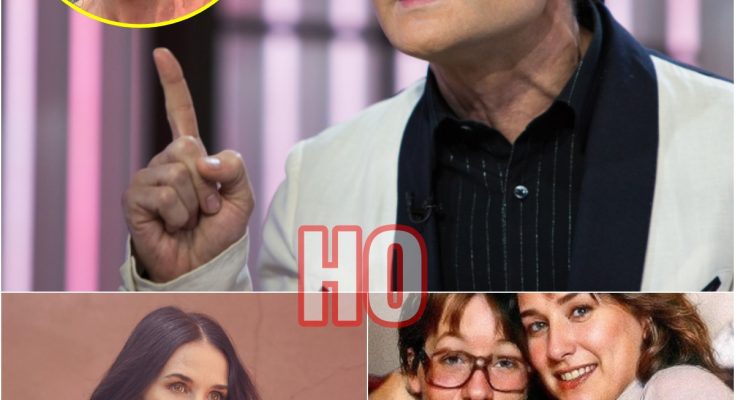Hollywood’s dark side keeps getting darker. First, it was parties with mysterious guest lists, now… it’s Demi Moore’s name in the spotlight. Is she just guilty by association? Or does this story go much deeper than we thought? Corey Feldman’s bombshell revelations have come back to light, calling out stars like Demi Moore for partying alongside the underaged. But just how far down does this Hollywood rabbit hole go?

Corey Feldman, once a celebrated child star, has spent years spotlighting the dark, secretive practices allegedly plaguing Hollywood. Known for exposing exploitation of young talent, Feldman has returned to the media forefront with accusations aimed at figures from his past, including actress Demi Moore. With discussions about Hollywood’s handling of young talent and its notoriously elite parties resurfacing, Feldman’s allegations and Hollywood’s response are reigniting debates about protecting the industry’s most vulnerable.
In the 1980s and 90s, Demi Moore became known for her daring, unfiltered persona, maintaining an enigmatic presence in Hollywood’s elite social circles. Feldman alleges that Moore and other Hollywood stars might have been associated with gatherings where young, impressionable actors mingled with industry powerhouses. Moore’s close connections with high-profile celebrities, including those known for hosting exclusive, risqué parties, have led some to wonder if she played a larger role in this circle than previously believed.
Feldman has long been vocal about the misconduct he and his late friend Corey Haim endured, allegedly at the hands of powerful Hollywood figures. Together, “The Two Coreys” rose to fame through films like The Lost Boys, becoming icons for young Hollywood in the process. However, beneath the fame, Feldman recounts that both he and Haim experienced traumatic incidents involving influential individuals in the industry. Their bond, he claims, was built on shared experiences of exploitation—a reality Feldman believes is common in Hollywood’s youth culture.
One of the most controversial stories resurfacing is Moore’s kiss with a young co-star, Philip Tanzini, in the early 80s. At the time, Moore, 19, kissed Tanzini, 15, during a celebratory public appearance. The footage, once viewed as an innocent display of friendship, has drawn renewed criticism in the context of modern discussions about boundaries and propriety. Feldman and others question whether this moment, now under heightened scrutiny, represents a larger pattern in Moore’s social and dating life, especially as she often dated significantly younger men, including her highly publicized relationship with Ashton Kutcher, 15 years her junior.

The issue deepens as other allegations arise regarding Hollywood’s lavish party culture, where young actors, artists, and newcomers could socialize with powerful figures under little oversight. Moore and Kutcher’s involvement in this party circuit, including gatherings hosted by music mogul P Diddy, is again being discussed in light of recent legal battles and allegations of misconduct surrounding Diddy. Moore’s presence in these circles has raised questions about whether these gatherings created an environment that blurred appropriate boundaries, especially for the industry’s younger members.
For Feldman, the allegations and speculation surrounding Moore are more than personal grievances; he sees them as emblematic of a broader problem. His recent public statements criticize what he describes as Hollywood’s “safe spaces” for inappropriate behavior, which he asserts have been part of the culture since at least the 1920s. Feldman’s own experiences and those of friends like Haim, he argues, are evidence of a systemic failure to protect young stars. He alleges that the industry lacks the transparency and accountability necessary to safeguard its youngest and most impressionable talents.
Feldman has also spoken extensively about the prevalence of age-inappropriate parties, gatherings he believes were intentionally designed to cater to Hollywood’s elite, often featuring young stars who were eager to fit into the scene. Through his advocacy, he continues to call out figures he deems complicit in perpetuating such practices. Feldman’s outspoken stance on these issues, coupled with his refusal to back down, has ignited support from those who believe his testimony reflects a serious and unresolved issue within Hollywood.
Today, Feldman’s criticisms are met with a mix of support and skepticism, as the industry struggles with its image amid a series of similar allegations against other celebrities. He calls for greater protections for young actors, urging Hollywood insiders to step forward and address what he describes as a “dark side” within the entertainment business.
Whether Feldman’s callouts lead to further investigations remains to be seen, but the conversation is undeniably shedding light on longstanding issues. For many, the hope is that by discussing these controversies openly, Hollywood can become a safer and more ethical environment for the next generation of stars.



